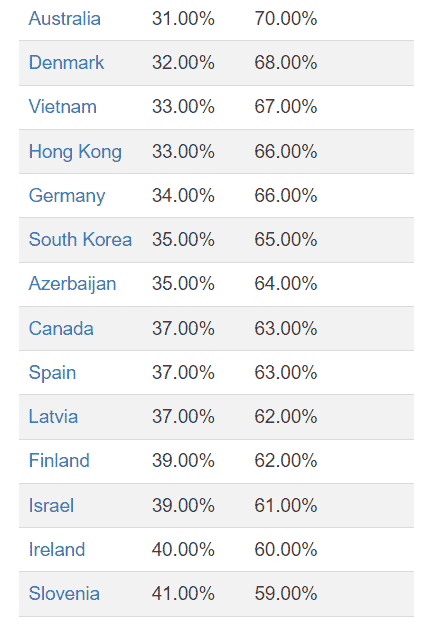Morality, at the most basic level, is about what’s good and bad, and ethics, on the other hand, is about what’s right and wrong. As such, religion does not have a monopoly over what they are all about etc. contrary to what many religious people seem to believe.
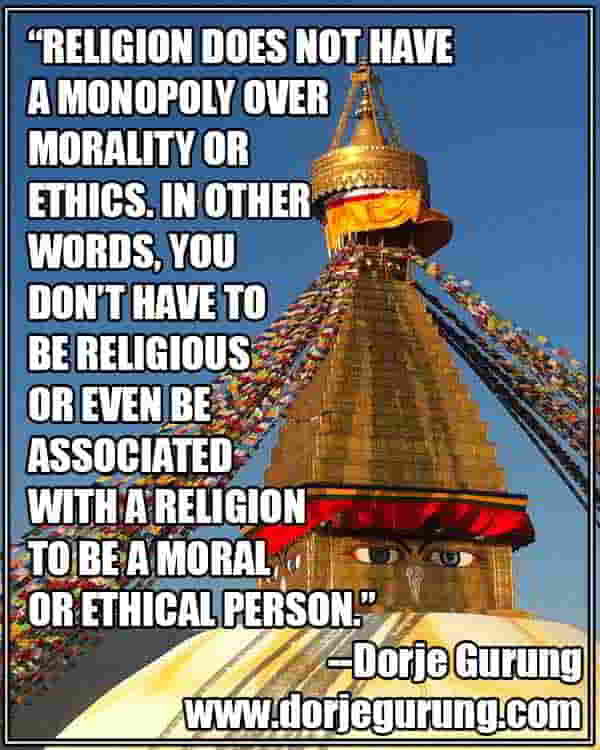
As a matter of fact, high level of religiosity in a population can be highly problematic for or in a society.
Nepali society is highly religious. The 2011 census report, for example, did NOT report ANY a-religious people or atheists (see below).
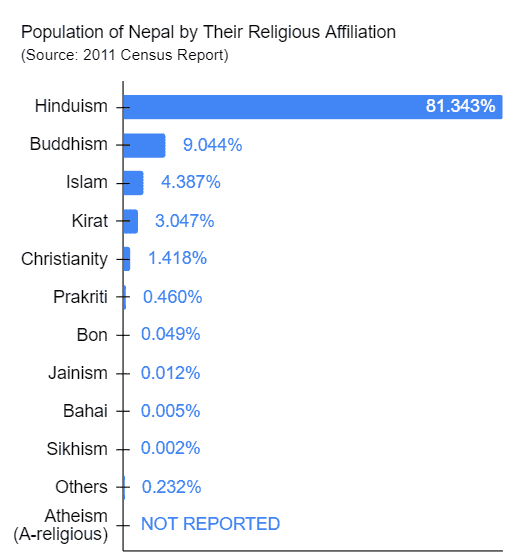
Worse, the default position or assumption of most Nepalis about fellow Nepalis (and even about many non-Nepalis) appear to be that they are religious and believe in God, or some form or idea of God. Besides, the cultural and social environment in Nepal, even now, discourages a person from declaring themself an atheist or a-religious. I wouldn’t be surprised if we were to find Nepalis who view atheists or the a-religious suspiciously.
In spite of the steady degeneration and degradation of the Nepali society over the last three decades, the general assumption and understanding among Nepalis appear to STILL be that one has to be religious in order to be — or that religion teaches us about what it means to be — a moral and ethical human being.
But of course, they are mistaken.
Many countries around the world have significant, or very high, percentage of atheists and/or a-religious but are still doing very well in areas that, if the religious were to be believed, shouldn’t. (Nepalis do view high divorce rates and the considerably more relaxed sexual mores in developed countries as evidence of degraded family values and morals.)
Here, to begin with, are the top 10 countries with the highest percentage of atheists as determined in 2017.
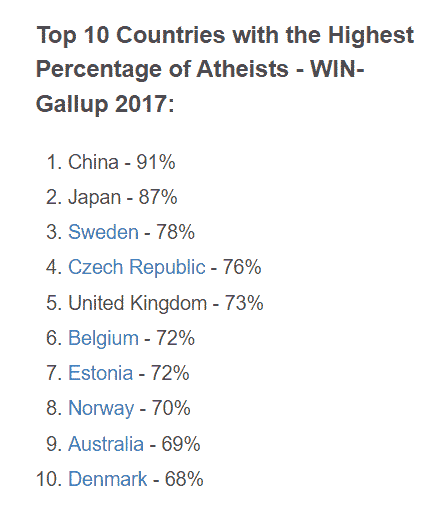
Notice how high the percentages are. Here’s the top 22 countries with the highest percentages as of now.
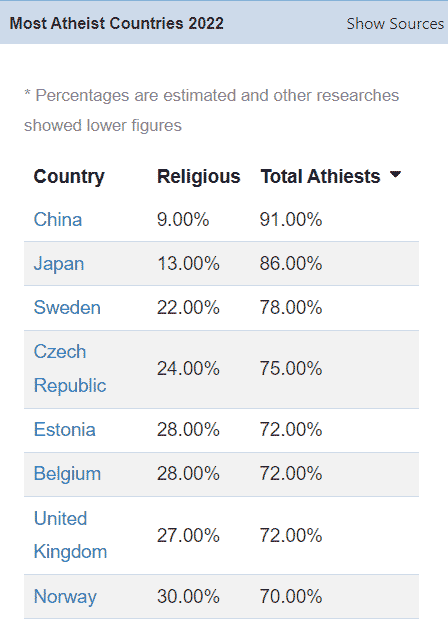
Nepal does NOT even feature in the list, not even at the bottom. That could mean a number of things, but the likely one is that Nepal does NOT have — and cannot furnish — reliable data on the subject.
Regardless, let’s look at how different countries fair in criteria which directly or indirectly “measure” the moral and ethical standing — or understanding — of their population.
Let’s start with the top 7 happiest countries in the world. Level of happiness in a country is determined by assessing their performance in a six different categories including “social support, healthy life expectancy, freedom to make your own life choices, generosity of the general population, and perceptions of internal and external corruption levels.”
- Finland
- Denmark
- Switzerland (percent atheists: not reported)
- Iceland (percent atheists: 54%)
- Netherlands (percent atheists: not reported)
- Norway
- Sweden
Most of the seven above have very high percentage of atheist population. Coincidence? I don’t think so.
Next, the top ten countries with the highest gender equality. Gender equality “measures the extent of gender-based gaps among four key dimensions: Economic Participation and Opportunity, Educational Attainment, Health and Survival, and Political Empowerment.”
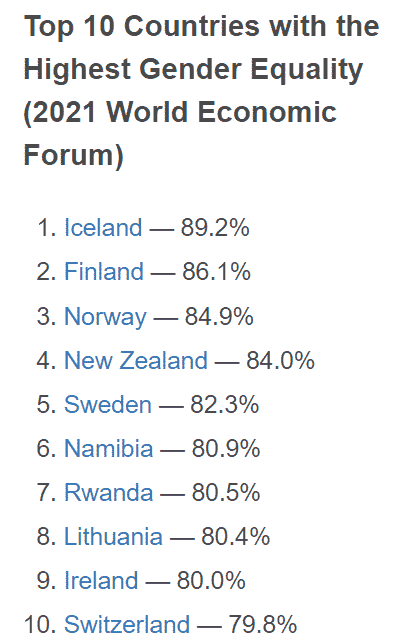
Again, notice, most of them are among the top twenty countries with the highest percentage of atheists.
What about the bottom ten countries, i.e. those with the biggest gap between the genders?
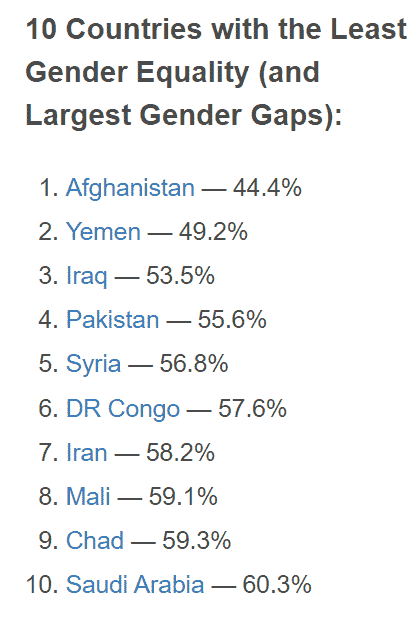
You should be able to tell just from the names, in most cases, that they are highly religious States! While Nepali society is NOT as religious as some of the above, and while in Hinduism we have many Goddesses, all indications are that the practice in Nepali society is to view and treat females as inferior to males and as second class citizens, and hence necessary to control. What is equality?! Forget equality.
Again, coincidence? Just correlation? Again, I don’t think so!
Next, the top ten countries scoring the highest in the quality of life index.
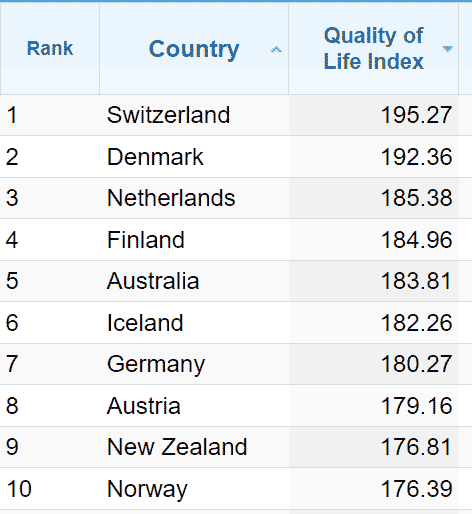
Again, what do you notice about this list and the twenty countries with the highest percentage of atheists? Most of them appear in that list. Just coincidence? Just correlation? I don’t think so.
The countries listed below are the top ten countries where justice prevails. (Click here for an article about it.)
- Denmark
- Norway
- Sweden
- Finland
- Netherlands
- New Zealand
- Austria
- Australia
- Germany
- Singapore
That is, in those countries the population have a strong sense of right and wrong, among other things. In contrast, in Nepal ONLY ~11% of the population have “ACCESS to justice mechanisms”! In other words, the systems, institutions, and people in positions of power have such a warped sense of justice, they have created a criminal justice system that only a small fraction of the population have access to the mechanism!
To what extent does justice prevail in Nepal? Likely, insignificant! Likely nowhere near as it does in one of the countries above.
Here are the top ten peaceful countries.
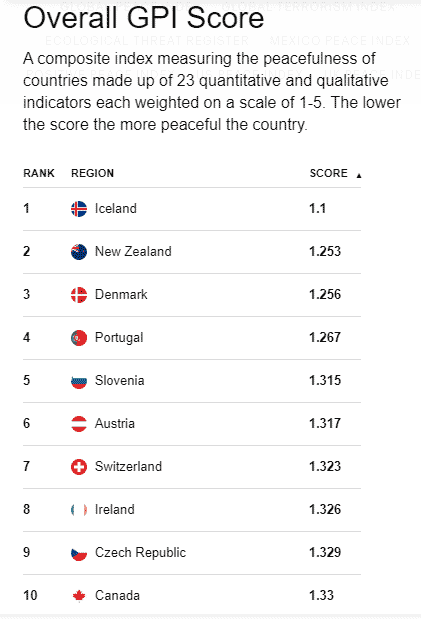
Notice, they are mostly countries we have already come across. Nepal’s score stands as 2.033 and we rank 85th.
Next, top ten safest countries in the world, which as you can tell aren’t much different.
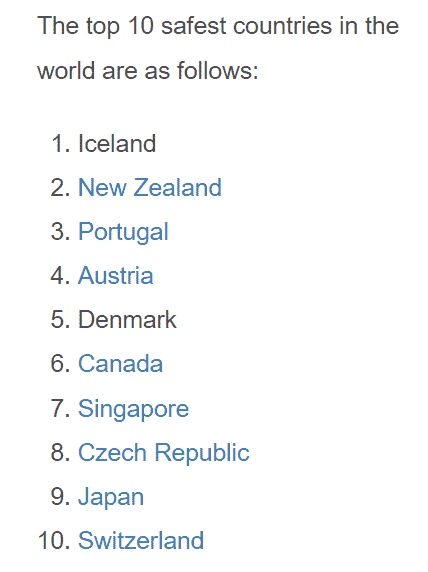
Next, here are the top ten countries that care the most about human rights followed by the bottom ten, that is, the ten that care the least.
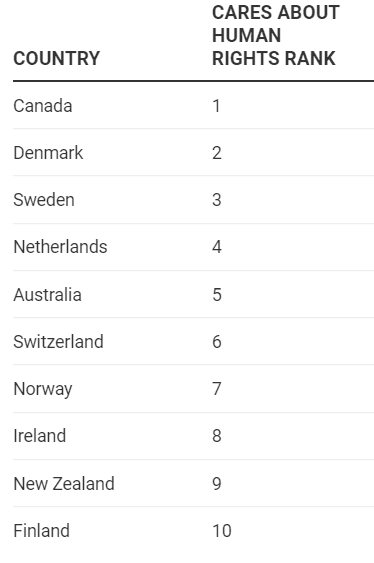
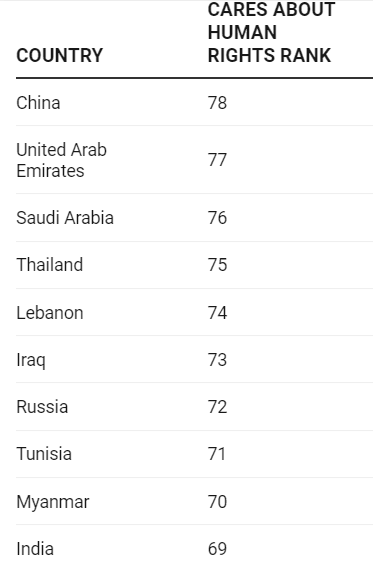
If you haven’t already noticed, China, with the highest percentage of atheist population, not only didn’t rank among the top ten in any, when it came to caring about human rights, it’s at the absolute bottom. Of course, there are always exceptions to rules or patterns, exceptions which are a result of other contributing or confounding factors. China is one of them.
One example does NOT make a rule; one exception does not break a rule! Stated in another way, outliers in a sufficient set of data with a definite pattern do not negate the pattern.
Human rights is about a myriad of different things, one of which is about being able to live a life of dignity. The social system in Nepal, the caste system, which is connected to Hinduism, strips many members of the society of their dignity — and even humanity. Where is the morality in that?! Where is the ethics in that?!
And finally, life expectancy, because of something the religious in Nepal argue…. Here are the top ten countries (territories have been crossed out) with the highest life expectancy.
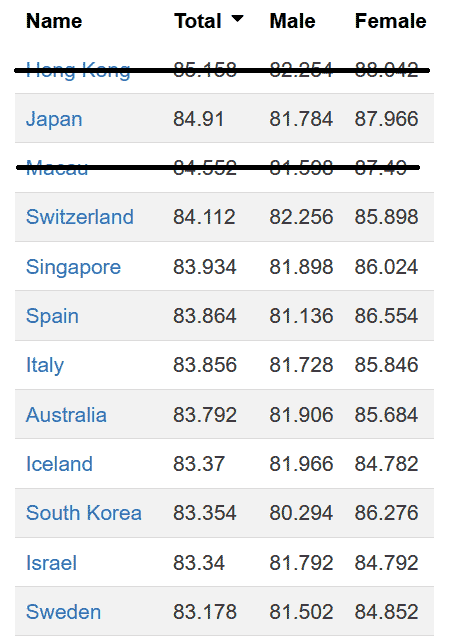
The result above, while being a little different from others, is not significantly different. In other words, the atheist population in countries above are either a majority or significantly high.
Here’s Nepal’s.
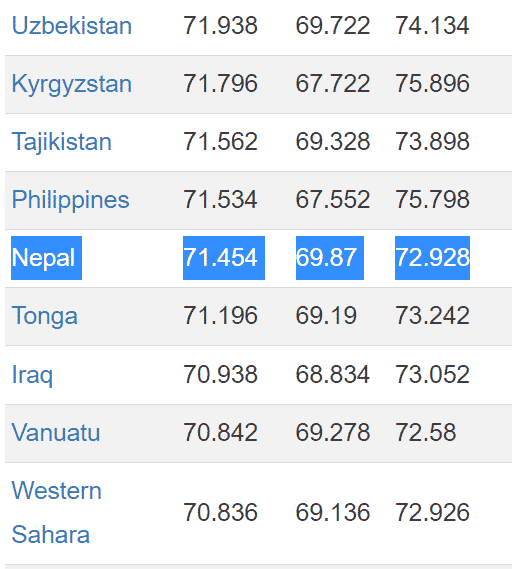
Our life expectancy is not much different from that of Iraq, which has seen conflict for most of the last twenty years. Granted, we also had a ten-year civil war from 1996-2006.
So why look life-expectancy? If many Nepalis are to be believed, being religious apparently saves lives because they pray. We don’t have a dearth of Nepalis who believe that they got through an illness or survived a medical procedure because of the prayers they and their loved ones said. And yet, we don’t rank anywhere near close to the top in life-expectancy.
I mean, untimely deaths, of course, affect the average life-expectancy of a population. Nepal still suffers from a high child mortality rate among others, for example. If religiosity or prayers helped people survive, why haven’t that helped Nepali infants survive and raised our ranking in life expectancy?! Just a question.
I have also observed something in Nepalis that I have observed in others around the world. Nepalis “feel hurt” or “offended” by remarks critical of their religion, religious beliefs and/or practices (such as festivals). I have also heard and seen Hindus complain that their religion, Hinduism, has been unfairly attacked by fellow Nepalis, has been targeted for criticism etc. They point out that people in developed countries, such as in the United Kingdom, aren’t critical of, or don’t make issues of — or protest against — religious beliefs and practices as often, as vociferously, and as openly as Nepalis do against Hinduism!
Except, people in countries like the United Kingdom did do that…just a long time ago. They did that at a time when the British population was highly religious, the way the Nepali population are NOW, in the 21st century. Of course, the British no longer protest against religions and their dogmas etc. because their past protests produced results: the proportion of the religious in their country is really small (28%) and their beliefs and practices of the religious have little to no influence or impact on the lives of the rest of the population!
One day, hopefully not too far into the future, the percentage of highly religious Nepalis will also be much smaller than that of the non-religious. Then, naturally, the need to protest against anything to do with Hinduism will be obviated, as none of the beliefs and practices associated with it will have ANY real adverse impact on the lives of the masses. They will no longer symbolize — among other things — the oppression and suppression they have always done thus far.
Additionally, what is moral and ethical will be based more on the needs of humans — humanity will prevail — and, as appears to be the case in many a-religious countries, rather than on that dictated by religion and dogma.
What do you think?
* * * * * * * *
Additional Reading
The following are relevant to the topic.
- If protests against Dassain hurt your sentiments…
- Like Gods, Like Humans? Or, Like Humans, Like Gods? Or, Like…F*cked up?
- When “Gods” Don’t Help
- Birth is a Beginning…Not an End…As the Hindus Would Have You Believe
- The Story of Eklavya and Dronarcharya: More of Caste Supremacy Than Model Discipleship
- Hold up a Mirror to a Closed and Inward-looking People, They’ll Shatter It
- Do Hindu Gods Discriminate Against Those Who Arrive Late to Heaven?
- Caste System Can Corrupt The Mind, Kill The Spirit, And Strip One of Humanity

